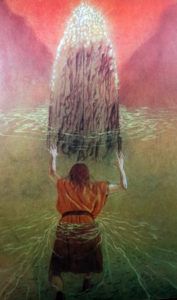For the context of this series, see here
Part One: The Rhine Gold
One sunny afternoon the Rhine – the largest river in the German lands – glittered like a huge silver ribbon amidst the dark green of the forests. In the area where its calm waves are intercepted by rocky masses on the banks and reefs that emerge in the middle of the current, the light was filtered by a faint mist that, like a subtle veil, enveloped the landscape.
Amidst the silence of the morning, only the cries and laughter of the undines, playful and joyful daughters of the father river, could be heard. With their swift mermaid-like movements, they moved from reef to reef. Their flowing hair looked like cascades of gold. Despite their amusing games, these undines fulfilled an important function. They guarded the gold of the Rhine and kept away anyone who wanted to seize it. Only the man who renounced love, preferring the wealth and power that the gold conferred, could do so.
With their dazzling beauty, the Rhine daughters incited those who approached the river to love, thus keeping them away from any intention of stealing the precious treasure they guarded. That was their mission.
Along the riverbed lived the Nibelungen in underground caverns. They were dwarves from the “Land of the Mists”, enemies of the gods of Valhalla, the heavenly abode where Wotan ruled.
One of their Nibelungen, Alberich, who had pursued the Undines, having been scorned by their constant rebuffs, made a formal promise to renounce love forever so that he could take possession of the gold of the Rhine and dominate the world.
-It has been a long time since the Nibelung Alberich has shown his shaggy hair in these parts.
-I have heard that he is no longer interested in pursuing us.
-Why?
-Because he has renounced love.
-Definitely?
-Yes, for good.
This was the dialogue that splendid afternoon between Woglinde and Wellgunde, the two undines who had most mocked the dwarf as he walked along the riverbank.
-If Alberich has renounced love, it must have been because of our contempt.
-Yes, because of our scorn and our mockery. Despair has led the rancorous Nibelung to renounce the enjoyment of man’s supreme good: love.
-Instead, this renunciation enables him to become the owner of riches and the ruler of the world.
-He who wants to achieve both must be encouraged to steal the gold that we guard.
-Indeed: I fear that Alberich will one day come to take possession of the gold that glitters in the depths.
-I don’t think the little man would dare. It’s too much of a feat for him.
-Well, I don’t know what we can do if that son of the black earth should think of going down to the bottom of the Rhine to plunder the gold that lights and brightens the waters.
-There he is! At this moment his rough figure is silhouetted against the crest of the steep bank.
-I can’t see him.
-Look to the left. On that promontory. Can you see him?
-Yes, I see it now. He prepares to jump into the water.
-Let’s get closer and try to lure him back to love.
-I think our attempt will be in vain. So long have we mocked him; so often have we fled from his amorous yearnings, that the scorned man thinks only of wealth and power.
-To get them, surely, he comes to steal the gold of the Rhine.
While the undines were talking, Alberich continued to watch the waters of the river. He followed slowly along the high bank as if looking for a suitable place to jump. When he saw a soft glow at the bottom of the water, his eyes sparkled with greed.
“This must be the place,” said the Nibelung to himself, “This must be the place where the reef on the top of which the gold of the Rhine shines; I will go down and pluck it out with my nails, I will take it to my underground caverns, I will rule over men, and my power will darken the power of the proud gods of Valhalla.
So saying, Alberich threw himself into the water and plunged into the depths of the river. He plucked up the treasure and retreated.

3 replies on “The Ring of the Nibelung, 1”
From Alberich’s physical appearance, behavior, and language, Wagner may have used the Nibelung as a metaphor for the archetypal Jew. Although retired German writer Michael Colhaze was not a Nazi, those who haven’t read his article in which Colhaze points out the similarities of Wagner’s ring to Tolkien’s should read it.
You used to have a lot of comments back then.
Many shared their thoughts and felt encouraged by your articles. That it’s mostly gone now.
Call me captain obvious, but it seems the Will to socialize and engage into discussions have been severely damaged after the COVID19 scare, as how they expected.
Sauron and the Ring have been very successful at alienating the people of middle earth and turning a lot of them into wraiths.
I rather get the impression that when I started saying that CQ was the primary cause of white decline and JQ a secondary infection, it scared away a lot of visitors – most of them in fact.
The racial right cannot tolerate a POV different from theirs. And as was already clear from my first comment in my now old post, “Wagner’s wisdom”, the way I saw things blames the Wraiths (the traitorous Aryans) more than Alberich/Sauron (the archetypal Jew, who lost his Semitic face in Tolkien’s LOTR).